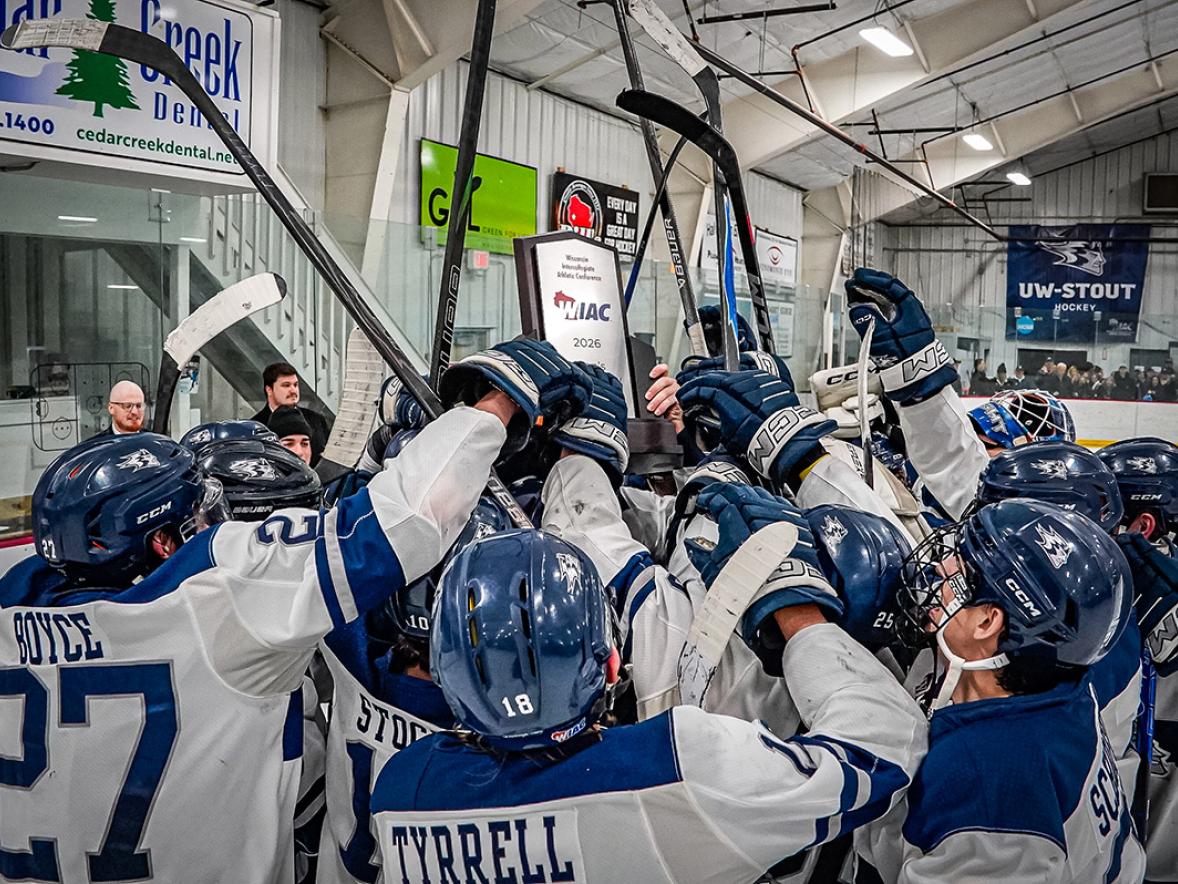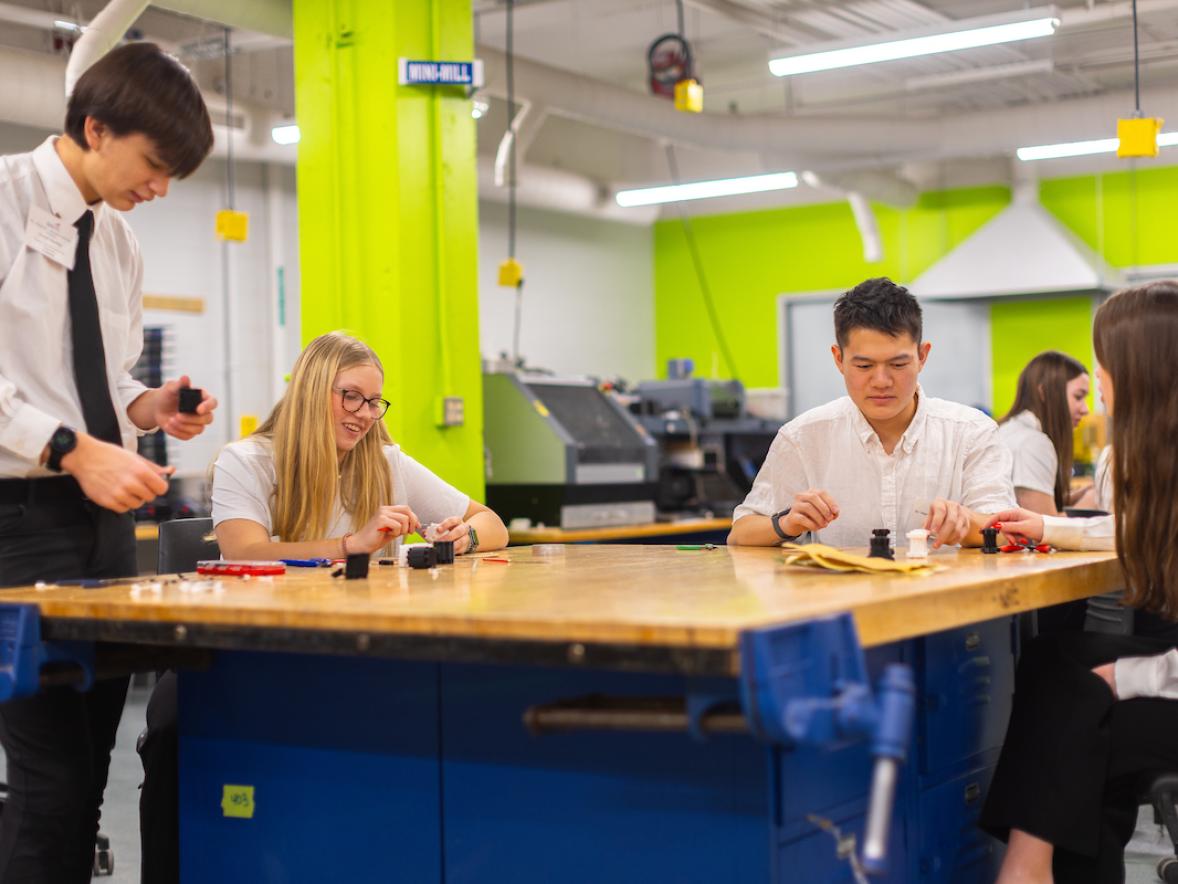Eating with a spoon seems like a simple task. However, it takes many small movements with hands and wrists and is difficult to replicate in robotic arms.
That is just one project students are working on at the eight-week University of Wisconsin-Stout Robotics for Assistive Technology Research Experience for Undergraduates.
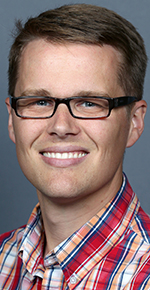 The REU aims to improve the technology to enable robots that would allow the elderly and those with disabilities to keep living independently, according to REU co-director Devin Berg, associate professor of engineering at UW-Stout.
The REU aims to improve the technology to enable robots that would allow the elderly and those with disabilities to keep living independently, according to REU co-director Devin Berg, associate professor of engineering at UW-Stout.
Cheng Liu, associate professor of engineering, is the other co-director.
UW-Stout has four undergraduate engineering majors and one graduate program, which are part of the Robert F. Cervenka School of Engineering.
The REU started June 18 and ends Friday, Aug. 10. Each of the eight students receive a $4,000 stipend and had their room and board covered by a $230,400 grant from the National Science Foundation. The three-year grant is in its third year.
The goal of the program is to help prepare students for graduate school, targeting first-generation, underrepresented minorities, women and persons with disabilities, as well as students from schools with limited research opportunities.
“The projects the students are working on, there are no easy solutions,” Berg said. “We try to continue the work from year to year. It mimics what they would be seeing if they do go to graduate school. They would work on a major project and advance it in some small way.”
As part of the program, students take part in workshops on how to apply to graduate school and take the Graduate Record Exam, the entrance exam for graduate school.
Berg enjoys the students who are participating. “I get to bring in new people, and I get to learn from them and hopefully advance the research,” Berg said.
The eight students and their home schools are:
- Sujay Bajracharya, Cleveland State University, Ohio
- Derek Belsky, Shippensburg University of Pennsylvania
- Alyssa Boccardi, Duquesne University, Pittsburgh, Pa.
- Meghan Hill, West Virginia University, Morgantown
- Benjamin Klave, California Polytechnic State University, San Luis Obispo
- Samantha Metevier, Seattle University
- Kayla Sneller, St. Cloud State University, Minn.
- Emily Swanson, UW-River Falls
Sneller, a senior majoring in mechanical engineering; Swanson, a senior majoring in the physics dual major; and Metevier, a senior computer science major, recently worked on a continuum manipulator for assistive technology to update the backbone of the flexible robotic arm.
“Our interest is to create an affordable alternative for people that is safe and flexible, “ Metevier said.
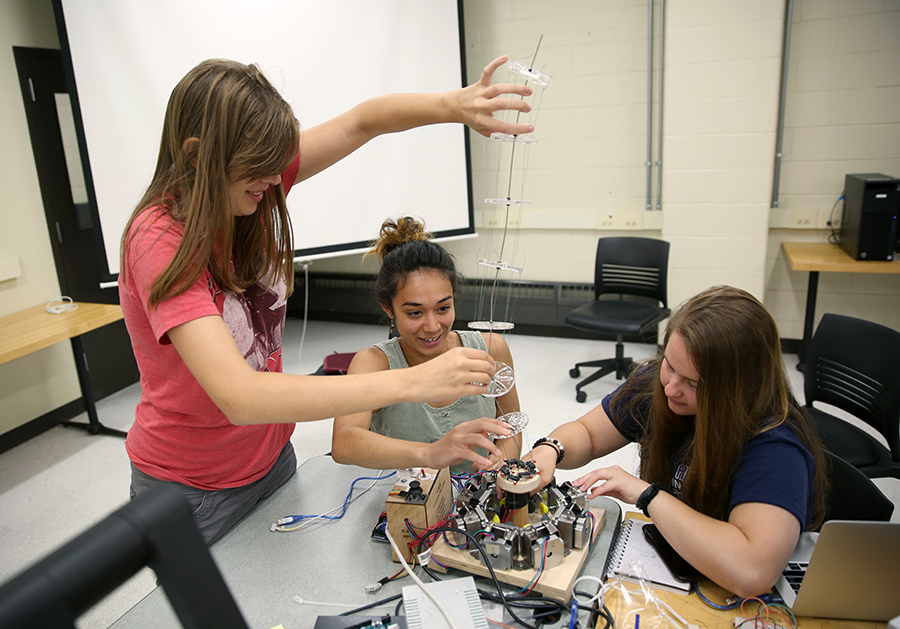
The team used a nickel titanium alloy to create the spine of the robot and added fishing line to apply force to guide the spine. “The big thing is if we can get it to work effectively to help people out,” Sneller said. “We have to test to see if it will be useful. The math behind the movements is very complicated.”
Sneller was interested in the REU because she wanted more experience working in robotics. “I really like the idea of using robotics to inspire kids to go into STEM,” she said, referring to careers in science, technology, engineering and mathematics.
Swanson is interested in working in the prosthetics and biometrics area and to “help people live the best life they can.”
Bajracharya and Belsky recently were working with a meal assistance robot. Using the Kinova JACO robotic arm and a Kinect, they are continuing research to allow users to feed themselves using facial expressions or voice commands.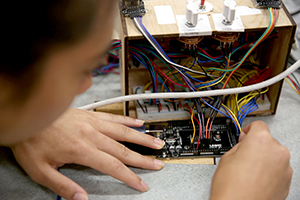
“It’s quite a complex set of motions,” said Bajracharya, a senior computer science major. “What we do almost without thinking with our hand is hard to program. That is one of the challenges.”
Bajracharya sought out the REU to get more research experience. “It’s been a challenge how to get the robotic arm to pick up food effortlessly and accurately,” he added. “It’s a challenge we may or may not solve.”
Belsky, a senior computer engineering major, said he really wanted to learn via the REU what graduate school would be like. He thinks he would enjoy graduate school but may work in his field first and then continue his education.
###
Photos
Top: Devin Berg
Middle: Robotics REU students Kayla Sneller, Samantha Metevier and Emily Swanson work on a continuum manipulator for assistive technology, a flexible robotic arm.
Bottom: A Robotics REU student works on wiring as part of a meal assistance robot.





